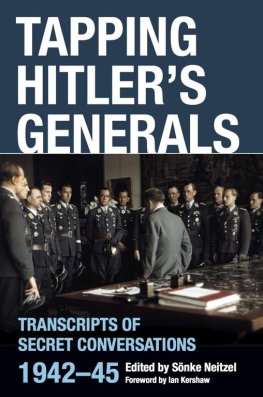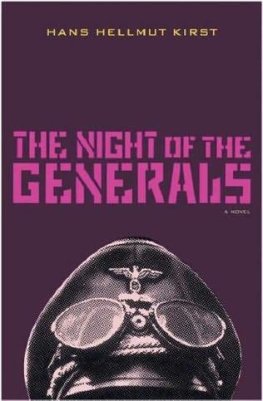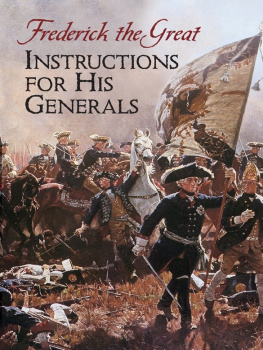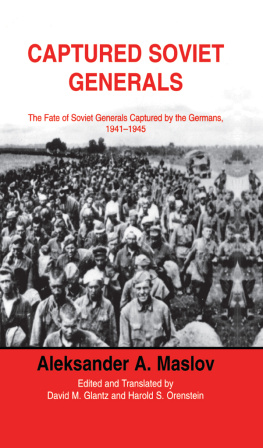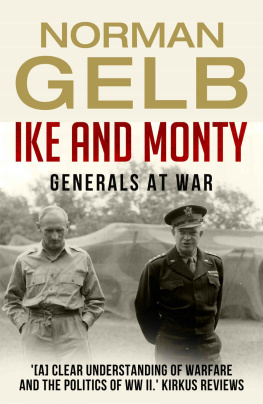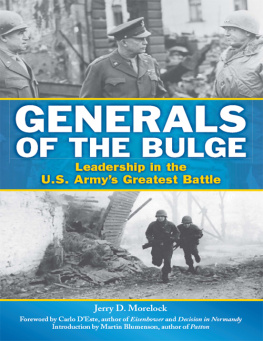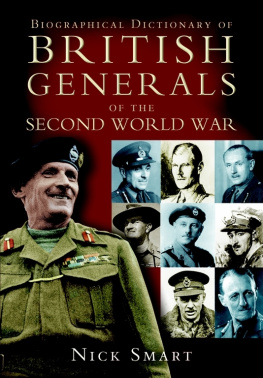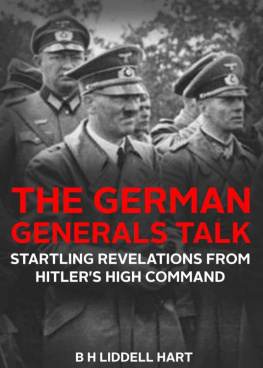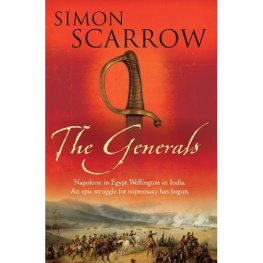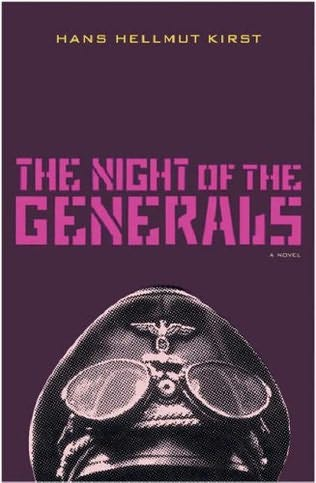Hans Hellmut Kirst
The Night of the Generals
Translated from the German by J. Maxwell Brownjohn
PART ONE
Prelude
Even death has its funny side
WARSAW, 1942
The body lay in the middle of the room between the table and the bed. Anyone looking at it from the door would have mistaken it for a bulging sack. It lay huddled up, face buried in the carpet.
"Nice carpet, that," said the man who stood surveying the scene, legs planted firmly apart. "Pity about the blood, though. It's completely messed up."
He looked like a healthy, contented boy. His cheeks were plump and ruddy and his eyes friendly and appealing, as though on the look-out for congenial playmates.
"Death occurred barely two hours ago," said another man, who was leaning against the door-post. "We notified you immediately in accordance with standing instructions."
The cheerful, boyish-looking man, whose name was Engel, nodded. Kneeling down, he grasped the corpse by the hair, pulled the head back and inspected the face. It stared back at him with waxen rigidity, mouth agape and eyes wide with horror. Something of the dead woman's wild, dark beauty remained in spite of her contorted expression.
"She must have been spectacular in bed," mused Engel.
His companion, who was still leaning against the doorframe, motionless as a graven image, gave no sign of having heard his remark. His eyes were like extinct craters, grey, inaccessible and hard as volcanic rock. He looked gnarled and desiccated, like an old gnome.
"Did you hear, Liesowski?" Engel asked the gnomelike man. "For a corpse, I think she looks pretty good--or don't you agree?"
"Naturally I agree," replied Liesowski.
"Even when you agree with me you manage to be irritating," said Engel. He rose to his feet with a grunt. Having made an excellent dinner on the pick of the left-overs from the generals' table, washed down with schnapps, he had been planning an agreeably strenuous night with a woman agent in military intelligence. Instead, his after-dinner entertainment had turned out to be a dead body. "What's the matter, don't you like her?"
Detective-Inspector Roman Liesowski of the Warsaw police shook his head a trifle indulgently. "I've never been able to see much charm in a corpse, Herr Engel."
"Not even in your capacity as a Polish patriot?"
"I've been a policeman for almost as long as I can remember and I've come across a lot of dead bodies in my time, but my sole reaction is always: who did it? I've spent a lifetime hunting down murderers without developing the slightest sense of patriotism."
"That," said Engel cheerfully, "is probably the reason why you're still alive and kicking, Liesowski. We Germans give you a chance to do your duty, and in return you're allowed to breathe our air, eh?"
Engel laughed gaily and slapped the breast of his leather raincoat, which gleamed dully in the subdued light. "Well, my friend, why did you send for me? Not just to show me a beautiful corpse, surely?"
"The woman's name was Maria Kupiecki."
"Well? She's only one corpse among many. They're as thick as fleas on a dog's back in this city. The world's full of them, so why disturb my well-earned night's rest?"
"Maria Kupiecki--also known as 'Countess' Kupiecki--was one of the people whom we have to provide with police protection on request. Her name figures in your official list, so she must have been working for German intelligence."
"Ah, now I get it!" Engel beamed happily like a schoolboy who has been given a new football. "That explains why I was struck by your smug attitude the moment I came in. I know exactly what you're thinking: one traitor less! Any murder's all right with you, but a patriotic murder's twice as welcome."
"Take a closer look at the body," recommended Liesowski, unruffled. "This piece of butchery had nothing to do with patriotism."
"Why not? Don't you think any of your keen and determined fellow-countrymen would go to such lengths?"
'This isn't what one would call a normal murder. The man didn't just finish her off. He made a revolting mess of the body."
Engel slowly withdrew his gaze from the Inspector and transferred it to the inert bundle, once a human being, which lay on the floor in front of him.
"Get this straight, Liesowski," Engel said softly, as if anxious to avoid being overheard. "If you try and concoct any unpleasant surprises for us you'll end up a corpse yourself."
Roman Liesowski raised both hands as though in surrender, but it was a half-hearted and not particularly convincing gesture. His expression was morose. "We seem to be at cross purposes. I'm talking about a bestial murder, nothing more. I've drawn no political conclusions whatsoever."
For a brief instant Engel seemed disconcerted and his smile lost some of its ebullience, but he quickly regained his air of exuberant geniality.
"All right then, you can proceed with your inquiries under my supervision, but I shall have to notify my superior. Until Major Grau arrives I can only hope you don't come up with anything stupid. I don't want to have to find a replacement for you if I can avoid it."
"I shall be glad to do all I can," Liesowski replied dryly, "but judging by the look of things I can't promise that you'll be overjoyed at the results of my investigation. Perhaps it would be better--better for you, I mean--if you took over the case yourself."
But Engel had resumed his inspection of the body. "Why did the bitch have to die?" he asked with the sudden petulance of a child whose balloon has burst. "She looks as though she'd have given one a good time. It's always the same, though. Women like her bring nothing but trouble in the end."
The air in the room was close and muggy. It was a compound of stale perfume, the foetid sweetness of blood-soaked clothing and the acrid smell of Engel's Brazilian cigar.
Major Grau, head of counterespionage for the Warsaw area, arrived an hour later. His overcoat, which was draped negligently round his shoulders, made an elegant rustling sound, audible evidence that he selected only the finest materials for his wardrobe.
"There's no need to apologize," he announced, "not in advance, at least. I'm at your disposal day and night if necessary. Was it necessary in this case?"
Before Engel could reply the Major demonstrated his observance of formalities by extending his hand to the Polish policeman--not forgetting to remove his pigskin glove first--and uttering a few cordial words of greeting. Liesowski sketched a small bow.
"First, let us deliberate," said Major Grau, his features illumined by a look of gentle, scarcely perceptible irony. "Be good enough to send your men outside, Inspector. I think it would be appropriate if we opened the proceedings in private. Allow me to commandeer your chair, my dear Engel. It looks extremely comfortable--but then the whole room gives a cosy impression. I know it already, by the way. This isn't my first visit, though from the look of things it will probably be my last."
Major Grau chatted away like a guest at an afternoon tea party. He selected a cigarette from his gold case, but not before offering one to Roman Liesowski, who tucked it away in his breast pocket.
"I'm listening," said Major Grau, when the Inspector's assistants had left the room as instructed. His air was that of a business man awaiting a proposition.
Liesowski recounted the known facts with due objectivity: at 11:05 p.m. screams had been heard, but produced no immediate reaction from anyone in the house; shortly afterwards someone telephoned the police and a policeman called to investigate; towards midnight the homicide squad turned up, identified the body without difficulty and informed the German authorities; Sergeant Engel arrived, postponed further investigation and notified Major Grau.


